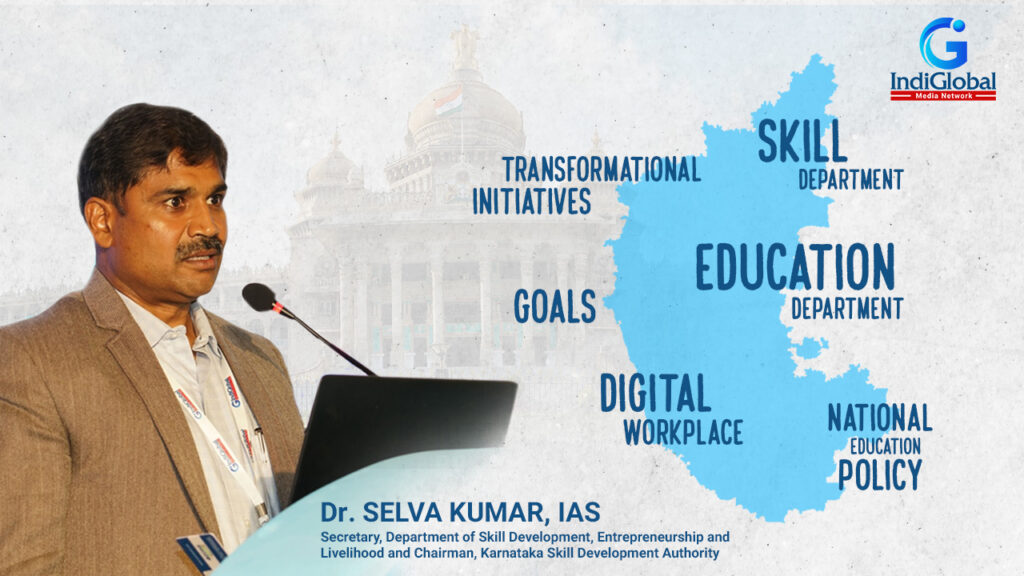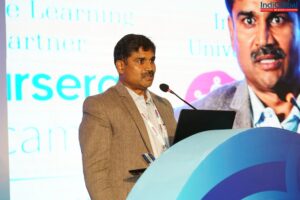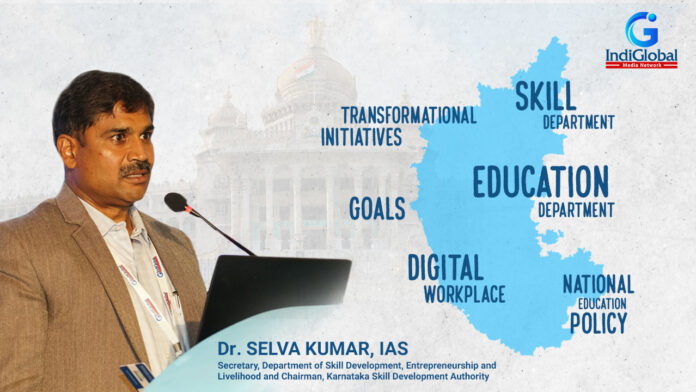 Dr. S. Selva Kumar, Secretary, Department of Skill Development, Entrepreneurship and Livelihood and Chairman, Karnataka Skill Development Authority speaks to Sudheer Goutham on Karnataka Government’s plans in transforming education with skilling in particular
Dr. S. Selva Kumar, Secretary, Department of Skill Development, Entrepreneurship and Livelihood and Chairman, Karnataka Skill Development Authority speaks to Sudheer Goutham on Karnataka Government’s plans in transforming education with skilling in particular
What were the transformational initiatives taken up & its impact on the citizens of Karnataka?
A new department was created in 2016 by drawing from six verticals and was coined skill development, entrepreneurship and livelihood. Initially, all were working in silos and not talking to each other within our own department due to legacy issues. There were challenges. We tried our best to bring in synergy among the verticals. If we have to talk about skilling we have long term skilling and short term skilling goals. In the long term skill we have ITIs and also government tool room training center.
In Karnataka, we have our own Chief Minister’s Yojana and through that program we are able to bring in skill training in different trades. We are able to get the leads of the industry as well as the trades.
 In the short term skill training, we have introduced the new element that is providing the training according to the needs of the industry. That way we have customized our Chief Minister’s Karnataka Yojana for the basic requirement of our own industries. Therefore we have content interaction with industries that we identify their requirements and accordingly fine tune the course content and provide them the training.
In the short term skill training, we have introduced the new element that is providing the training according to the needs of the industry. That way we have customized our Chief Minister’s Karnataka Yojana for the basic requirement of our own industries. Therefore we have content interaction with industries that we identify their requirements and accordingly fine tune the course content and provide them the training.
The GTTC which is also there in the long term courses and 30 of them are there in all our districts out of them 15 are the center of excellence. Those 15 centers are used as the skill hubs for our training. Apart from this we have Karnataka German technical training institutes -KGTTIs 5 in numbers which is set up with the help of GIT Government of Germany. Those institutions are also providing a centre of excellence facility and they are specialized in short term skill courses. And it is basically the industry driven courses.
You also hold the position in education department. How could you integrate both the education and skill?
No wonder the education policy 2020 has given a thrust to our education system. Synergy between the skill development department and the education department is a need of the hour. We need to have more skill hubs as we have to provide vocational training to students of 10th, 11th & 12th. Here we can utilize our resources available in our ITIs & KGTTIs and that’s the way we need to converge ourselves with the education department.
The present digital workplace needs modern skills. Would you like to tell us what the skill department of Karnataka is doing in this direction?
 We have 270 ITIs under the governmental system, 196 institutions and around 10,115 ITIs are in the private sector. These institutions are providing the skill training but they are all in trades and traditional skill sets. In order to upgrade ourselves to the industry 4.0 needs we wanted to have the collaboration with the private partnership so the public private partnership thought of we have approached the Tata Technology Ltd. They have now collaborated with the 20 multinational companies.
We have 270 ITIs under the governmental system, 196 institutions and around 10,115 ITIs are in the private sector. These institutions are providing the skill training but they are all in trades and traditional skill sets. In order to upgrade ourselves to the industry 4.0 needs we wanted to have the collaboration with the private partnership so the public private partnership thought of we have approached the Tata Technology Ltd. They have now collaborated with the 20 multinational companies.
These multinational companies have provided us with the up-gradation of 150 government owned ITIs. These ITIs have built in new workshops, new technology labs, the technological equipment, machineries and all the other provisions required for the courses are being provided.
We have got the approval on all the six long term courses and five courses which are already lined with the existing courses. We have a total of 11 courses under the long term training program. And these courses are being afforded by all the ITIs. There ITIs will be acting as a skill and technology hub for the surrounding MSMEs industries. They can avail the services from these ITIs. And these ITIs can become the ancillaries for any industry in the state or in the countries.
 What are the goals for Karnataka Skill Development Department in the coming years?
What are the goals for Karnataka Skill Development Department in the coming years?
We have one more component which is livelihood. In entrepreneurship, there is a lot of potential to become entrepreneurs and in terms of livelihood, we are trying to get in touch with almost all the rural folks by mobilizing them by federating them and providing them access to credit. Once facilitation with quality production is done and provide market access which will transform the urban rural scenario of society. That way it will have an impact on the economy itself and this will lead to the cascading impact on the growth of GDP in the state. It was not a single day’s effort, we have to plan it and execute it in a proper way which is the challenge we have now.
What is your take in National Education Policy 2020?
NEP 2020 has its good elements. We have our own traditional system which we need to break the silos and make it happen and which I think is possible but it will revolutionize the education system in future. In terms of livelihood, we are trying almost all the rural folks. The flexibility to get students from one place to another is the remarkable provision in the NEP. National Education Policy is a progressive step.








